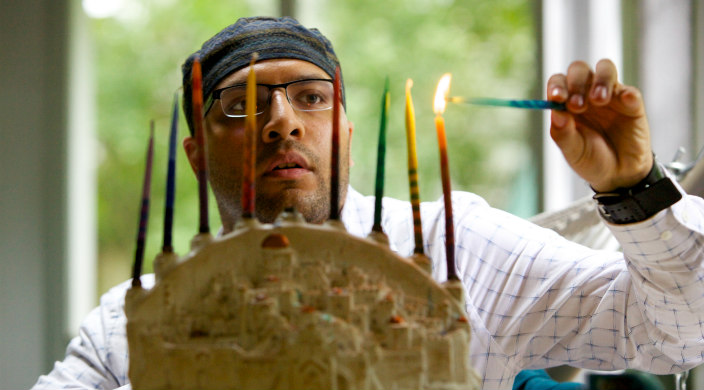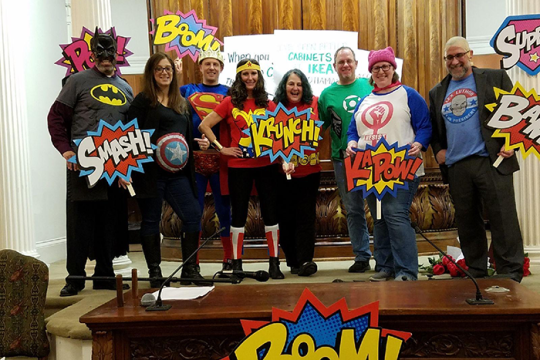
If you grew up in a Jewish home celebrating Jewish holidays, you probably have many sweet memories of your family’s Hanukkah celebrations.
Along with and dreidel games, you may recall the lessons associated with the holiday. Maybe you remember the story of the light, and how a small amount of oil miraculously burned for eight days instead of only one. Maybe you can still recite the blessings for the hanukkiyah without even looking at the text. Or maybe you remember the stories of the fierce and brilliant leader of the rebellion, the champion for religious freedom, Judah the Maccabee!
In Jewish tradition, we often focus on the grandest stories and the most miraculous tales – the parting of the Red Sea, the thunderous revelation atop Mount Sinai, or the Maccabees overpowering a much larger force to save our religion. Such stories help generations of young people discover the rich and exciting heritage of the Jewish people.
But what about Judah’s brothers? Do you remember hearing stories about them?
As Elijah the prophet teaches in 1 Kings 19, God’s great work is not in the wind or the fire or the greatest of earthquakes, but rather God is “a still small voice,” – the still small voice of inner discipline, of outer kindness, of law and love, of study and prayer – and in that still small voice is God to be found.
Certainly there are lessons we can learn from the quiet leaders who stood shoulder-to-shoulder with the great Judah.
Our story, told in the Book of Maccabees, begins when ruthless and aggressive King Antiochus IV Epiphanes insisted that Hellenism was to be the only culture and religion in his kingdom and tyrannically suppressed Judaism.
When royal officials reached Modi’in, ready to force Jews to worship Greek gods, Mattathias, a priest with five sons in Modi’in, killed the first Jew who, under order of the king, approached the pagan alter to sacrifice to Zeus.
Mattathias and his five sons – John Gaddi, Simon Thassi, Judas Maccabeus, Eleazar Avaran, and Jonathan Apphus, all flee. When Mattathias dies, Judas takes over, and his aggressive and brilliant war tactics bring him to celebrity.
But what do we know about the other brothers, each of whom was appointed as a general and charged with leading an army of about 1,500 men?
Eleazar is always identified with a war elephant as he endangered his life by attacking an elephant and thrusting a spear into its belly. The dead elephant then collapsed upon Eleazar, killing him in battle.
Jonathan, the youngest of the five sons, was known as a diplomat. After Judas was killed in battle, Jonathan succeeded him. He negotiated peace with the Syrian general Bacchides in exchange for war prisoners – and as the Book of Maccabees tells us, the “sword ceased in Israel” for five years. Using the peace to his advantage, he became a high priest in Jerusalem, rubbing elbows with kings of Syria and Egypt.
Simon assumed leadership of the Hasmoneans and their supporters, establishing a royal Hasmonean dynasty beginning with his son John Hyrcanus in 140 BCE. His descendants maintained political and religious control over Judea until it fell under Roman jurisdiction.
Although it’s Judah whom we recall with all the glory and charisma of a superhero, sometimes it’s the lesser-known and unsung heroes who are just as important in our people’s narrative. In fact, Judah’s brothers – the other Maccabees – were key players in securing peace and establishing a dynasty that lasted for decades.
To be a leader doesn’t mean you have to step into the limelight or onto the or even ascend to the highest position of power in your area of expertise. We all are capable of leadership and, in truth, our tradition calls on us again and again to lead a life worth living.
Whether we lead like Judah or like Jonathan – in the limelight amongst many or in quiet dedication – we are all leaders. Our tradition’s Hanukkah story reminds us that to successfully lead a purposeful life, we must harness the dedication, flexibility, passion, and ingenuity demonstrated by all the Jewish leaders – famous or not – who came before us.
Related Posts

Extraordinary Ordinary Heroes

Women of Valor: Revisiting Biblical Role Models


